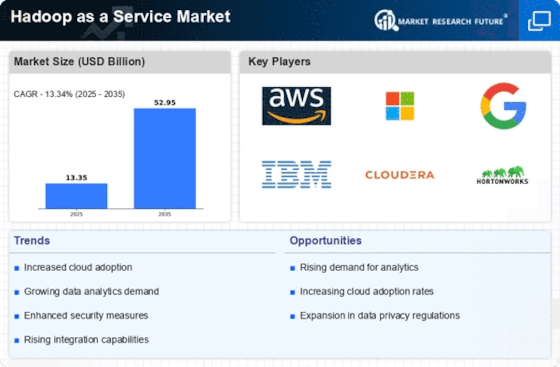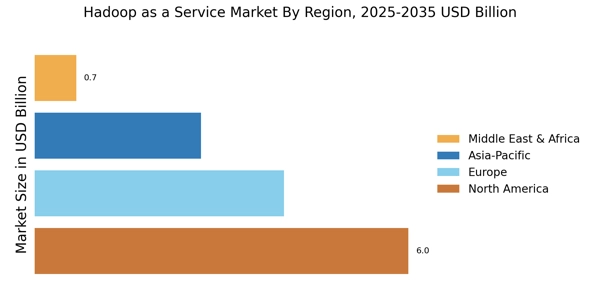Cost Efficiency and Scalability
Organizations are increasingly drawn to Hadoop as a Service Market due to its cost efficiency and scalability. Traditional data processing solutions often require substantial upfront investments in hardware and software. In contrast, Hadoop as a Service Market allows businesses to pay for only the resources they use, which can lead to significant cost savings. Furthermore, the ability to scale resources up or down based on demand is particularly appealing in today's dynamic business environment. This flexibility enables organizations to manage their data workloads more effectively, thereby enhancing operational efficiency. As a result, the Hadoop as a Service Market is likely to witness continued growth as more enterprises adopt this model to optimize their data management strategies.
Increased Focus on Data Governance
As data privacy regulations become more stringent, organizations are placing a greater emphasis on data governance. The Hadoop as a Service Market is responding to this need by offering solutions that facilitate compliance with various data protection laws. Companies are increasingly aware of the risks associated with data breaches and are seeking platforms that provide robust security features. Hadoop as a Service Market enables organizations to implement effective data governance frameworks, ensuring that data is managed responsibly and in accordance with regulatory requirements. This heightened focus on data governance is likely to drive growth in the Hadoop as a Service Market as businesses prioritize compliance and risk management.
Emergence of Hybrid Cloud Solutions
The trend towards hybrid cloud solutions is reshaping the landscape of data management. Organizations are increasingly adopting hybrid models that combine on-premises infrastructure with cloud-based services. This approach allows businesses to leverage the benefits of both environments, enhancing flexibility and control over their data. The Hadoop as a Service Market is poised to capitalize on this trend, as it offers solutions that seamlessly integrate with existing IT infrastructures. By enabling organizations to deploy Hadoop in a hybrid cloud environment, service providers can address the diverse needs of businesses seeking to optimize their data processing capabilities. This shift towards hybrid solutions is likely to contribute to the sustained growth of the Hadoop as a Service Market.
Growing Demand for Big Data Analytics
The increasing volume of data generated by organizations has led to a burgeoning demand for big data analytics solutions. As businesses seek to derive actionable insights from vast datasets, the Hadoop as a Service Market is experiencing significant growth. According to recent estimates, the big data analytics market is projected to reach USD 274 billion by 2025, indicating a robust appetite for scalable and efficient data processing solutions. Hadoop as a Service Market provides organizations with the necessary tools to analyze large datasets without the need for extensive on-premises infrastructure. This trend is likely to continue as more companies recognize the value of data-driven decision-making, thereby propelling the Hadoop as a Service Market forward.
Rise of Machine Learning and AI Integration
The integration of machine learning and artificial intelligence into data processing frameworks is becoming increasingly prevalent. Organizations are leveraging these advanced technologies to enhance their data analytics capabilities. Hadoop as a Service Market is well-positioned to benefit from this trend, as it provides the necessary infrastructure to support complex algorithms and large-scale data processing. The ability to analyze data in real-time and derive insights through machine learning models is driving demand for Hadoop as a Service Market solutions. As businesses continue to invest in AI and machine learning initiatives, the Hadoop as a Service Market is expected to expand, offering innovative solutions that cater to these evolving needs.

















